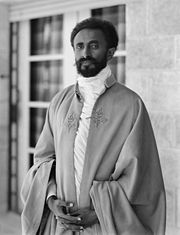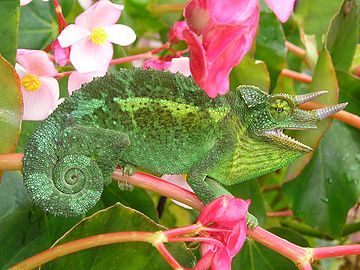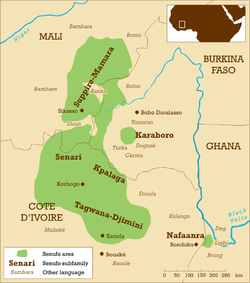Portal:Africa



Africa is the world's second-largest and second-most populous continent after Asia. At about 30.3 million km2 (11.7 million square miles) including adjacent islands, it covers 20% of Earth's land area and 6% of its total surface area. With nearly 1.4 billion people as of 2021, it accounts for about 18% of the world's human population. Africa's population is the youngest among all the continents; the median age in 2012 was 19.7, when the worldwide median age was 30.4. Based on 2024 projections, Africa's population will exceed 3.8 billion people by 2100. Africa is the least wealthy inhabited continent per capita and second-least wealthy by total wealth, ahead of Oceania. Scholars have attributed this to different factors including geography, climate, corruption, colonialism, the Cold War, and neocolonialism. Despite this low concentration of wealth, recent economic expansion and a large and young population make Africa an important economic market in the broader global context, and Africa has a large quantity of natural resources.
Africa is highly biodiverse; it is the continent with the largest number of megafauna species, as it was least affected by the extinction of the Pleistocene megafauna. However, Africa is also heavily affected by a wide range of environmental issues, including desertification, deforestation, water scarcity, and pollution. These entrenched environmental concerns are expected to worsen as climate change impacts Africa. The UN Intergovernmental Panel on Climate Change has identified Africa as the continent most vulnerable to climate change.
The history of Africa is long, complex, and varied, and has often been under-appreciated by the global historical community. In African societies the oral word is revered, and they have generally recorded their history via oral tradition, which has led anthropologists to term them "oral civilisations", contrasted with "literate civilisations" which pride the written word. African culture is rich and diverse both within and between the continent's regions, encompassing art, cuisine, music and dance, religion, and dress.
Africa, particularly Eastern Africa, is widely accepted to be the place of origin of humans and the Hominidae clade, also known as the great apes. The earliest hominids and their ancestors have been dated to around 7 million years ago, and Homo sapiens (modern human) are believed to have originated in Africa 350,000 to 260,000 years ago. In the 4th and 3rd millennia BCE Ancient Egypt, Kerma, Punt, and the Tichitt Tradition emerged in North, East and West Africa, while from 3000 BCE to 500 CE the Bantu expansion swept from modern-day Cameroon through Central, East, and Southern Africa, displacing or absorbing groups such as the Khoisan and Pygmies. Some African empires include Wagadu, Mali, Songhai, Sokoto, Ife, Benin, Asante, the Fatimids, Almoravids, Almohads, Ayyubids, Mamluks, Kongo, Mwene Muji, Luba, Lunda, Kitara, Aksum, Ethiopia, Adal, Ajuran, Kilwa, Sakalava, Imerina, Maravi, Mutapa, Rozvi, Mthwakazi, and Zulu. Despite the predominance of states, many societies were heterarchical and stateless. Slave trades created various diasporas, especially in the Americas. From the late 19th century to early 20th century, driven by the Second Industrial Revolution, most of Africa was rapidly conquered and colonised by European nations, save for Ethiopia and Liberia. European rule had significant impacts on Africa's societies, and colonies were maintained for the purpose of economic exploitation and extraction of natural resources. Most present states emerged from a process of decolonisation following World War II, and established the Organisation of African Unity in 1963, the predecessor to the African Union. The nascent countries decided to keep their colonial borders, with traditional power structures used in governance to varying degrees. (Full article...)
Selected article –
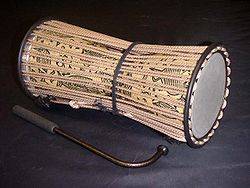
The talking drum is an hourglass-shaped drum from West Africa, whose pitch can be regulated to mimic the tone and prosody of human speech. It has two drumheads connected by leather tension cords, which allow the player to change the pitch of the drum by scraping the cords between their arm and body.
Originating from the 18th century, talking drum players used tones to disseminate messages, such as news of ceremonies and commands, over 4-5 mile distances. (Full article...)
Featured pictures –
Did you know (auto-generated) -

- ... that Malabo Mosque cost about two billion Central African CFA francs to build?
- ... that before the swearing-in of convicted murderer Kenny Motsamai as an MP, South African Chief Justice Mogoeng Mogoeng cited a constitutional requirement prohibiting felons from becoming MPs?
- ... that Gil Scott-Heron's 1975 song "Johannesburg" was banned in South Africa during apartheid?
- ... that the growth of Christianity in 20th-century Africa has been termed the "fourth great age of Christian expansion"?
- ... that South African civil rights activist Thambi Naidoo was arrested along with Mahatma Gandhi and sent outside of Transvaal for refusing to register?
- ... that the communist-era science-fiction novel Małe zielone ludziki presents a futuristic depiction of Africa that reflects Polish perceptions of the continent during the Cold War?
Categories
Selected biography –
Sir Aaron Klug (11 August 1926 – 20 November 2018) was a British biophysicist and chemist. He was a winner of the 1982 Nobel Prize in Chemistry for his development of crystallographic electron microscopy and his structural elucidation of biologically important nucleic acid-protein complexes. (Full article...)
Selected country –
 |
 |
|
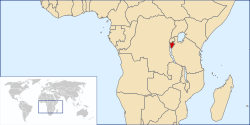
| ||
Burundi, officially the Republic of Burundi, is a small country in the Great Lakes region of Africa. It is bordered by Rwanda on the north, Tanzania on the south and east, and the Democratic Republic of the Congo on the west. Although the country is landlocked, much of its western border is adjacent to Lake Tanganyika.
The politics of Burundi take place in a framework of a transitional presidential representative democratic republic, whereby the President of Burundi is both head of state and head of government, and of a multi-party system. Executive power is exercised by the government. Legislative power is vested in both the government and the two chambers of parliament, the Senate and the National Assembly.
Geographically isolated, facing population pressures and having sparse resources, Burundi has the lowest nominal GDP per capita in the world. (Read more...)
Selected city –
Porto-Novo (Portuguese for 'New Port', Portuguese pronunciation: [ˈpoɾtu ˈnovu], French pronunciation: [pɔʁtɔnɔvo]; Yoruba: Àjàṣẹ́; Fon: Xɔ̀gbónù; also known as Hogbonu and Ajashe) is the capital and second-largest city of Benin. The commune covers an area of 110 square kilometres (42 sq mi) and as of 2002 had a population of 223,552 people.
Situated on an inlet of the Gulf of Guinea, in the southeastern portion of the country, the city was originally developed as a port for the transatlantic slave trade led by the Portuguese Empire. It is Benin's second-largest city, and although it is the official capital, where the national legislature sits, the larger city of Cotonou is the seat of government, where most of the government buildings are situated and government departments operate. (Full article...)
In the news
- 28 March 2025 –
- Russian authorities say that yesterday's sinking of the Sindbad submarine in Hurghada, Egypt, killing six Russians, happened during boarding and not due to a collision as reported. (The National)
- 27 March 2025 – Haitian crisis
- A Kenyan police officer deployed in Haiti as part of the Multinational Security Support Mission is killed in a suspected gang ambush, according to Haitian authorities. Kenya has confirmed that the officer is missing but has not yet verified his death. (BBC News)
- 27 March 2025 –
- At least six people are killed and 39 others are rescued after a Sindbad submarine carrying Russian tourists sinks off the Red Sea coast of Hurghada, Egypt. (BBC News)
- South Sudanese vice president Riek Machar is detained by security forces following an arrest warrant on "unclear charges", according to his spokesperson. The Sudan People's Liberation Movement-in-Opposition says Machar's arrest has effectively ended the 2018 peace agreement which ended the civil war. (Sky News)
- 26 March 2025 – Sudanese civil war
- Battle of Khartoum
- RSF occupation of the Khartoum International Airport
Updated: 17:05, 30 March 2025
General images -
Africa topics
More did you know –
- ... that Dutch malacologist Adolph Cornelis van Bruggen is an expert in African land snails?
- ... that a 20‑day study reported by BirdLife International discovered 265 species of birds in Nki National Park?
- ... that Kalulu, an African boy who died in 1877, was modeled in Madame Tussauds and attended Dr. Livingstone's funeral in London?
- ... that Samuel Jackman Prescod became the first person of African descent elected to the Parliament of Barbados?
Related portals
Major Religions in Africa
North Africa
West Africa
Central Africa
East Africa
Southern Africa
Associated Wikimedia
The following Wikimedia Foundation sister projects provide more on this subject:
-
Commons
Free media repository -
Wikibooks
Free textbooks and manuals -
Wikidata
Free knowledge base -
Wikinews
Free-content news -
Wikiquote
Collection of quotations -
Wikisource
Free-content library -
Wikispecies
Directory of species -
Wikiversity
Free learning tools -
Wikivoyage
Free travel guide -
Wiktionary
Dictionary and thesaurus









